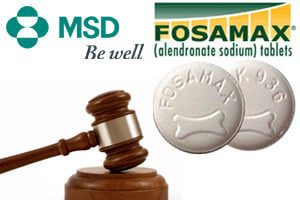
This week, a New York federal judge denied a request to mandate hundreds of alleged Fosamax victims to substantiate their injuries. Fosamax is manufactured by Merck & Co. U.S. District Judge John Keenan refused the request that would not only force hundreds of plaintiffs to substantiate their injuries, but also face dismissal of their cases […]
 This week, a New York federal judge denied a request to mandate hundreds of alleged Fosamax victims to substantiate their injuries. Fosamax is manufactured by Merck & Co.
This week, a New York federal judge denied a request to mandate hundreds of alleged Fosamax victims to substantiate their injuries. Fosamax is manufactured by Merck & Co.
U.S. District Judge John Keenan refused the request that would not only force hundreds of plaintiffs to substantiate their injuries, but also face dismissal of their cases from a multidistrict litigation (MDL) over Fosamax, according to Law360. Judge Keenan said the process would degrade into arguments over the merits of each case.
At a hearing last week, Merck attorneys said they identified some 600 questionable cases in the MDL and asked that the judge issue a “Lone Pine” order mandating the plaintiffs to provide expert reports that link Fosamax to their injuries, according to Law360. The same judge issued a Lone Pine order last November, but refused this recent request saying that the court would have to perform individualized determinations and the order would also risk loss of viable cases from the litigation.
“While Merck is correct that a Lone Pine order would not constitute a judicial finding that certain claims are spurious or ‘meritless,’ it would be inappropriate for the court to get involved in the fight between the parties on the merits even if is just for the purpose of commencing the Lone Pine process, as it would have to do if it granted Merck’s motion,” the judge said, according to Law360.
More than 1,000 plaintiffs claim Fosamax led to osteonecrosis of the jaw (ONJ). Seven cases reached trial as bellwethers; Merck has won five. The rest have been consolidated in an MDL before Judge Keenan for pretrial processing prior to being returned to plaintiffs’ home districts, Law360 explained.
Research has revealed that risks for developing ONJ following dental extractions raises significantly in patients taking bisphosphonates and the risks dramatically increase if the drugs were received intravenously, according to the study published in the International Journal of Oral and Maxillofacial Surgery.
In 2005, the U.S. Food & Drug Administration (FDA) ordered that warnings about ONJ be added to labels for Fosamax and other bisphosphonates. It is believed that osteonecrosis may develop when bisphosphonates prevent the body from repairing microscopic damage to the jawbone, such as what is seen during routine dental procedures.
Bisphosphonates like Fosamax have been associated with a number of other serious side effects. In October 2010, for example, the FDA asked the manufacturers of bisphosphonates used to treat osteoporosis, including Fosamax, to add information to the “Warnings and Precautions” section of the drugs’ labels describing the risk of atypical thigh fractures after a study linked long-term use of such drugs to this side effect. Most recently, studies have indicated that long-term use of oral bisphosphonates may increase risks for esophageal cancer.


